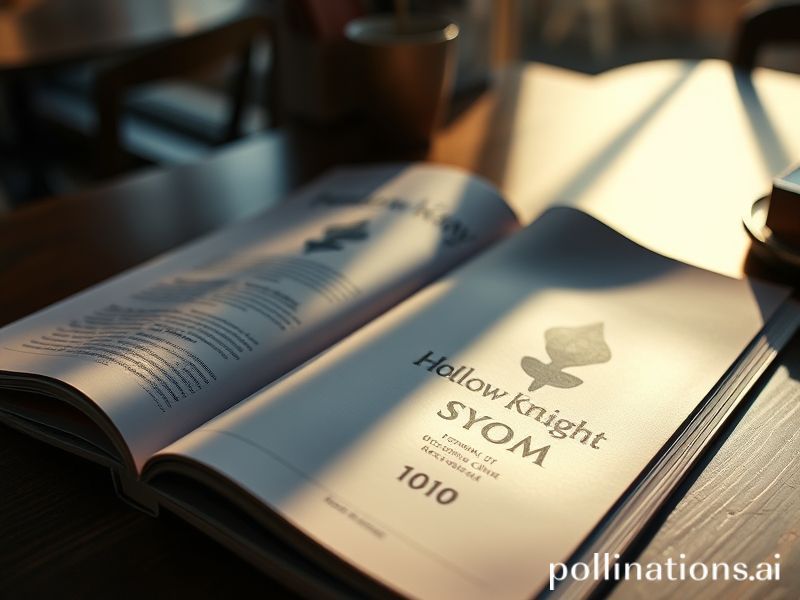Across Continents, Critics Crown Silksong—While Humanity Proves It’s Still Hopelessly Addicted to Pain
Hollow Knight: Silksong Reviews – Or, How the World Unites in the Sweet Agony of Waiting
By Dave’s International Correspondent-at-Large (and Part-Time Masochist)
The planet’s diplomats may be failing on climate, trade, and whatever a “rules-based order” is supposed to mean this week, but give humanity a 2-D Metroidvania sequel and suddenly we achieve a level of consensus rivaled only by the universal dislike of airline food. From Seoul to São Paulo, the first batch of Hollow Knight: Silksong reviews has dropped, and the global verdict is in: we are all Hornet now—nimble, armed, and slightly annoyed that it took six years to get here.
Let us tour the carnage. In Tokyo, Famitsu awarded the game a perfect 40/40, an honor previously reserved for titles that move literal truckloads of PlayStation 5s. One editor claimed the combat “evokes the precision of a sushi chef cutting fugu while riding a bullet train,” which is either high praise or a confession of latent occupational trauma. Meanwhile, Germany’s GameStar praised the “clockwork level design” and docked a single point because the load times on the European Switch eShop servers “felt like waiting for Bundesliga VAR.” (Germans: never knowingly undercooked on bureaucracy.)
Across the Channel, the Guardian’s reviewer—a man whose byline photo suggests he’s personally witnessed the fall of at least three British prime ministers—called Silksong “a balm for our fractured age.” He then compared the game’s interconnected kingdoms to post-Brexit trade routes, proving that even escapism is not safe from geopolitical metaphor. The French, naturally, focused on aesthetics: Le Monde hailed the “watercolor melancholia” and suggested the art team must have bathed in absinthe and heartbreak. Vive l’artiste, etc.
In the United States, where discourse ranges from “10/10 masterpiece” to “literally unplayable because the frame rate dipped once in Pharloom’s elevator,” IGN bestowed a 9/10, deducting a point for “minor bugs” and because, statistically, American reviewers are contractually obligated to leave room atop the scale for whatever Rockstar releases next decade. Over on Twitch, U.S. streamers spent launch week speed-running the game blindfolded, thereby inventing a new Olympic sport nobody asked for but everybody watched while doomscrolling.
The Global South, so often an afterthought in gaming narratives, elbowed its way onto the leaderboard. Brazilian outlet IGN Brasil ran a front-page feature titled “Silksong: A Aranha que Salvou Minha Ansiedade Existencial,” noting that local players embraced Hornet’s acrobatics as a metaphor for “navigating the bureaucratic web of Rio’s public transport.” In Lagos, Polygon Nigeria—yes, that’s a thing now—lauded the game’s resource economy as “more stable than the naira,” a line so dry it could desiccate a rainforest.
China’s social networks, where censors usually wield the banhammer like a caffeinated Thor, momentarily looked the other way as #丝之歌 (“Silksong”) trended for 36 straight hours. State media outlet People’s Daily even posted a tongue-in-cheek infographic: “Five Leadership Lessons from Hornet’s Aerial Combos.” Somewhere, an apparatchik is updating the social-credit algorithm to reward parrying.
The meta-implication? In an era when global supply chains snap, currencies yo-yo, and half the planet argues about which apocalypse to schedule first, Silksong has become the rare export that clears customs everywhere. Its Metacritic score hovers at 92, which is approximately the same number of weeks the game spent on “Coming Soon” lists. Analysts at Goldman Sachs—because nothing screams “fun” like investment-bank hot takes—now classify indie Metroidvanias as “geopolitically neutral soft power,” right up there with K-pop and Korean fried chicken.
And yet, beneath the acclaim lies a darker truth: we, the collective gamerdom, have willingly chained ourselves to another Sisyphean cycle. The same Reddit threads that celebrated launch day have already pivoted to “When is the Hornet DLC?” and “Team Cherry, please fix hitbox on Ascension 47.” The global village, it turns out, is just a slightly larger hamster wheel painted gorgeously in indigo and regret.
So here we stand—united, exhausted, and already speed-running our own patience. Somewhere in a quiet Adelaide studio, the developers sip tea, watch the world combust with joy, and quietly whisper: “Git gud, Earth.”
Conclusion: Silksong didn’t just review well; it became a planetary Rorschach test. Every nation projected its neuroses onto Hornet’s cloak and called it consensus. If that isn’t the most 2024 thing imaginable, I don’t know what is. Now if you’ll excuse me, I’ve got a date with a Brazilian spider-goddess and a Nigerian internet café—because in the end, we are all just bugs in Team Cherry’s beautifully hollow world.







